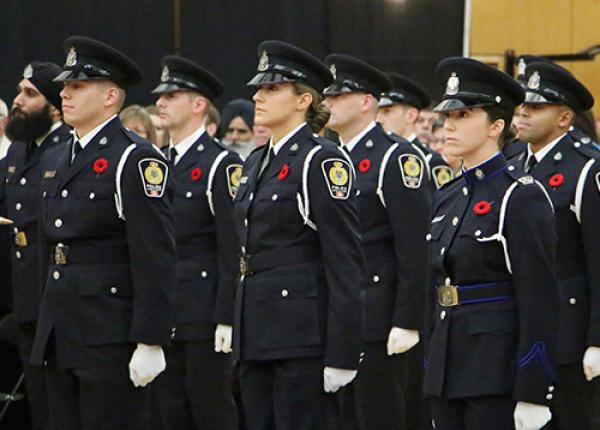
The Police Academy delivers provincially-approved basic training to all new municipal police recruits in B.C. It also offers advanced training for police officers serving in municipal departments, the RCMP and other law enforcement agencies serving in the province.
The Basic Peace Officer Training Program for municipal police recruits is composed of three separate blocks of training.
Block I
The first block of training (14 weeks) takes place at the Police Academy. It places heavy emphasis on police skills (such as driver training, firearms, arrest and control, investigation and patrol techniques), legal studies, physical fitness, foot drill (dress and deportment), and an introduction to the social sciences. The intent of Block I is to develop a relevant knowledge base for the Block II field training.
Block II
In Block II, the recruit constable returns to their home police department for a period of 18 to 21 weeks. During this field-training component, the recruit works under the guidance and continuous assistance of an experienced, specially trained constable (known as a field trainer). The field trainer is responsible for ensuring that the recruit receives a wide exposure to general police work. As a result, the recruit has the opportunity to apply the knowledge gained in Block I within an operational setting.
Block III
In Block III (9 weeks), the recruit constable returns to the Police Academy, bringing experience from the “street scene.” This block builds on the knowledge of Block I, and the practical experience of Block II, to prepare the recruit to function independently upon graduation. After successfully completing Block III, the recruit graduates as a “Qualified Municipal Constable” that is designated by regulation, pursuant to the Police Act.
Recruit Tuition
- Recruit tuition must be paid in full before the start of Block One training at the JIBC Police Academy.
- The 2025 tuition rate is currently $18,378.00 and is subject to change without notice. Please note that tuition is non-refundable.
The Police Academy provides advanced training opportunities for skill development and career enhancement for municipal police officers and the RCMP.
Courses are restricted to employees of law enforcement agencies and must be secured through municipal police department/RCMP training officers.
For more information, visit the contract training page.
The Police Academy is pleased to provide a number of resources and information of interest to police officers, students, and others considering careers in law enforcement
10-8 Newsletter
The In Service 10:8 Newsletter is a publication published six times a year for police officers. It provides information about current issues facing law enforcement officers. Read the latest issue.
Subscribe online to receive future issues of the newsletter.
To read previous editions of the newsletter, visit the online archive available from the JIBC Library.
Unless otherwise noted all articles are authored by Mike Novakowski, MA, LLM. The articles contained herein are provided for information purposes only and are not to be construed as legal or other professional advice. The opinions expressed herein are not necessarily the opinions of the Justice Institute of British Columbia.
In Service: 10-8 welcomes your comments or contributions to this newsletter via email.
BC Police Code of Ethics
The BC Police Code of Ethics articulates a commonly accepted set of ethical values for all police officers in the Province of British Columbia. It became official with a signing ceremony hosted at the Justice Institute of British Columbia on January 14, 2005. The Code of Ethics is prominently displayed at every police recruit graduation ceremony held at the Justice Institute of British Columbia.
BC Association of Police Boards
The British Columbia Association of Police Boards (BCAPB) is a provincial non-profit association formed in 1992 to facilitate the exchange of information and provide educational opportunities to members, municipal police boards, including First Nations, and Designated Policing governing authorities.
JIBC Library
The JIBC Library offers a specialized collection of justice and public safety resources unique in North America.